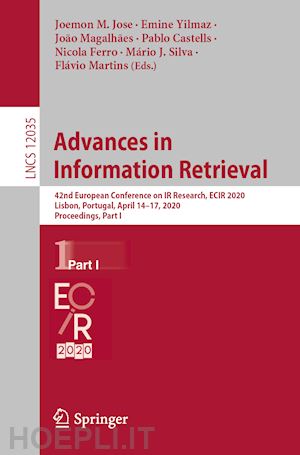
Questo prodotto usufruisce delle SPEDIZIONI GRATIS
selezionando l'opzione Corriere Veloce in fase di ordine.
Pagabile anche con Carta della cultura giovani e del merito, 18App Bonus Cultura e Carta del Docente
This two-volume set LNCS 12035 and 12036 constitutes the refereed proceedings of the 42nd European Conference on IR Research, ECIR 2020, held in Lisbon, Portugal, in April 2020.*
The 55 full papers presented together with 8 reproducibility papers, 46 short papers, 10 demonstration papers, 12 invited CLEF papers, 7 doctoral consortium papers, 4 workshop papers, and 3 tutorials were carefully reviewed and selected from 457 submissions. They were organized in topical sections named:
Part I: deep learning I; entities; evaluation; recommendation; information extraction; deep learning II; retrieval; multimedia; deep learning III; queries; IR – general; question answering, prediction, and bias; and deep learning IV.
Part II: reproducibility papers; short papers; demonstration papers; CLEF organizers lab track; doctoral consortium papers; workshops; and tutorials.
*Due to the COVID-19 pandemic, this conference was held virtually.
Deep Learning I.- Seed-guided Deep Document Clustering.- Improving Knowledge Graph Embedding using Locally and Globally Attentive Relation Paths.- ReadNet: A Hierarchical Transformer Framework for Web Article Readability Analysis.- Variational Recurrent Sequence-to-Sequence Retrieval for Stepwise Illustration.- A Hierarchical Model for Data-to-Text Generation.- Entities.- Context-guided Learning to Rank Entities.- Graph-Embedding Empowered Entity Retrieval.- Learning Advanced Similarities and Training Features for Toponym Interlinking.- Patch-based Identification of Lexical Semantic Relations.- Joint Word and Entity Embeddings for Entity Retrieval from a Knowledge Graph.- Evaluation.- Evaluating the Effectiveness of the Standard Insights Extraction Pipeline for Bantu Languages.- Recommendation.- Axiomatic Analysis of Contact Recommendation Methods in Social Networks: an IR perspective.- Recommending Music Curators: A Neural Style-Aware Approach.- Joint Geographical and Temporal Modeling based on Matrix Factorization for Point-of-Interest Recommendation.- Semantic Modelling of Citation Contexts for Context-aware Citation Recommendation.- TransRev: Modeling Reviews as Translations from Users to Items.- Information Extraction.- Domain-independent Extraction of Scientific Concepts from Research Articles.- Leveraging Schema Labels to Enhance Dataset Search.- Moving from formal towards coherent concept analysis: why, when and how.- Beyond Modelling: Understanding Mental Disorders in Online Social Media.- Deep Learning II.- Learning based Methods for Code Runtime Complexity Prediction.- Inductive Document Network Embedding with Topic-Word Attention.- Multi-components system for automatic Arabic diacritization.- A Mixed Semantic Features Model for Chinese NER with Characters and Words.- VGCN-BERT: Augmenting BERT with Graph Embedding for Text Classification.- Retrieval.- A Computational Approach for Objectively Derived Systematic Review Search Strategies.- You Can Teach an Old Dog New Tricks: Rank Fusion applied to Coordination Level Matching for Ranking in Systematic Reviews.- Counterfactual Online Learning to Rank.- A Framework for Argument Retrieval: Ranking Argument Clusters by Frequency and Specificity.- Relevance Ranking based on Query-Aware Context Analysis.- Multimedia.- Multimodal Entity Linking for Tweets.- MEMIS: Multimodal Emergency Management Information System.- Interactive Learning for Multimedia at Large.- Visual Re-ranking via Adaptive Collaborative Hypergraph Learning for Image Retrieval.- Motion Words: A Text-like Representation of 3D Skeleton Sequences.- Deep Learning III.- Reinforced Rewards Framework for Text Style Transfer.- Recognizing Semantic Relations: Attention-Based Transformers vs. Recurrent Models.- Early detection of rumours on Twitter via stance transfer learning.- Learning to Rank Images with Cross-Modal Graph Convolutions.- Diagnosing BERT with RetrievalHeuristics.- Queries.- Generation of Synthetic Query Auto Completion Logs.- What Can Task Teach Us About Query Reformulations?.- A Regularised Intent Model for Discovering Multiple Intents in E-Commerce Tail Queries.- Utilising Information Foraging Theory for User Interaction with Image Query Auto-Completion.- Using Image Captions and Multitask Learning for Recommending Query Reformulations.- IR – general.- Curriculum Learning Strategies for IR: An Empirical Study on Conversation Response Ranking.- Accelerating Substructure Similarity Search for Formula Retrieval.- Quantum-like Structure in Multidimensional Relevance Judgements.- Question Answering, Prediction, and Bias.- Temporal Latent Space Modeling for Community Prediction.- KvGR: A Graph-Based Interface for Explorative Sequential Question Answering on Heterogeneous Information Sources.- Answering Event-Related Questions over Long-term News Article Archives.- bias goggles - Graph-based Computation of the Bias of Web Domains through the Eyes of Users.- Deep Learning IV.- Biconditional Generative Adversarial Networks for Multiview Learning with Missing Views.- Semantic Path-Based Learning for Review Volume Prediction.- An Attention Model of Customer Expectation to Improve Review Helpfulness Prediction.











Il sito utilizza cookie ed altri strumenti di tracciamento che raccolgono informazioni dal dispositivo dell’utente. Oltre ai cookie tecnici ed analitici aggregati, strettamente necessari per il funzionamento di questo sito web, previo consenso dell’utente possono essere installati cookie di profilazione e marketing e cookie dei social media. Cliccando su “Accetto tutti i cookie” saranno attivate tutte le categorie di cookie. Per accettare solo deterninate categorie di cookie, cliccare invece su “Impostazioni cookie”. Chiudendo il banner o continuando a navigare saranno installati solo cookie tecnici. Per maggiori dettagli, consultare la Cookie Policy.